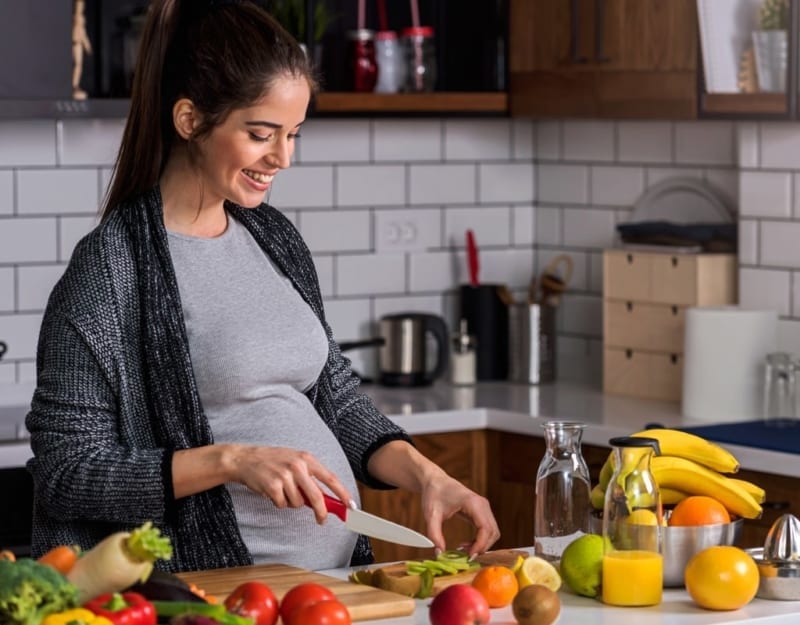Promotion for NZ Eggs.
A nutrient vital to the health of babies in the womb may be missing from the diets of many mothers.
Women who don’t follow healthy eating guidelines during pregnancy may risk missing out on a key nutrient vital to the life-long health of their unborn babies, a nutrition expert fears.
Healthy nutrition guidelines
Dr Clare Wall, the head of nutrition and dietetics at the University of Auckland, says a 2017 report – which she authored – revealed up to 97 per cent of New Zealand women are not eating according to the healthy nutrition and eating guidelines set by the Ministry of Health.
As a result she worries many may not be getting sufficient amounts of choline, a little known nutrient which is especially important for infants in their first 1000 days (the nine months of pregnancy and up to the age of two) for brain development and the prevention of birth defects.
Although only acknowledged as a required nutrient by the US Institute of Medicine as recently as 1998, international medical opinion suggests that such is its importance in fetal and infant brain development it is a nutrient that cannot afford to be overlooked.
“If pregnant women follow the guidelines they should be getting enough choline, but our research suggests many may be at risk of not doing so,” Wall says. The research, part of the Growing up in New Zealand study, also shows only one in five women met a specific recommendation to eat at least two daily serves of protein foods such as lean meat, fish and eggs.
Choline food sources
Wall says choline is present in other foods in the ministry’s guidelines but eggs are one of the richest and easiest of sources. The nutrient is also found in liver, peanuts, pasta, rise, spinach, beets and wheat.
“The first two years of life is critical for human development and growth,” she says. “Within that period there are critical windows of development, so optimal nutrition during this time is vital to set a child up for the rest of his or her life.”
Although only one of many required nutrients, choline plays an important role in various functions of the body including the liver and muscles and for helping store and process memories. It is an essential nutrient meaning most of it must come from food because the body produces only small amounts.
Research conducted in the US through Cornell University in 2017 also supports this view. Its findings suggest that when expectant mothers consume sufficient amounts of choline, their offspring gain enduring cognitive benefits.
The study’s author, Professor Marie Caudill, an expert on the impact of choline on maternal and infant health, says despite this most pregnant women consume less than the recommended 450mg per day.
“A prudent approach would be to increase dietary choline intake by consuming more animal source foods during pregnancy – egg yolks, lean meats, fish and poultry,” Caudill says. “For women who restrict animal-sourced foods, a choline supplement may be needed.”
Wall says while eggs have been maligned in the past, they are one of the best sources of choline and have been given a big tick for nutrition, protein and vitamins by the Ministry of Health, the Heart Foundation and the NZ Nutrition Foundation. The Heart Foundation says even those at risk of heart disease can eat 6 -7 eggs a week.
Two large eggs contain up to 400mg of choline which is well over half the recommended amount for pregnant women. Choline is contained in the egg yolk, the white being a good source of protein.
The importance of choline after birth
Wall says for the first six months of an infant’s life, breast milk is the best source of choline. However from that point on introducing eggs into the diet is fine.
“Previous recommendations were that eggs ought not to be introduced until a child turned one, but it is quite okay from six months, about the time most mothers start weaning their babies,” she says. “Probably they will start with something like a bit of scrambled egg on a spoon and then gradually increase the amount from there.
A 2016 study published in the Journal of the American College of Nutrition revealed that 90 per cent of Americans are not getting enough choline, a percentage experts believe is likely to be similar in New Zealand and Australia. The American study also found only 15 per cent of people have even heard of choline, let alone being aware of its importance.
The US Department of Health and Human Services recommends a daily intake of choline of 125mg for an infant from birth to six months and 150mg daily between the ages of one and three.
The department recommends adult women need 425mg per day, but 450mg during pregnancy and 550mg while breastfeeding. The recommendation for adult men per day is 550mg.
Visit eggs.org.nz for recipes, meal ideas and inspiration, how-to videos and subscribe to free monthly recipe e-newsletters. Eggs – super naturally good with 14 essential nutrients for everyday health and wellness.
This article was originally published by NZ Herald and is reproduced here with permission.
See more:








Eggs are good especially for pregnant women. It should be hard boiled. However, if one is concerned about cholesterol, one can eat more of the white than the yolk.
I have never heard of choline and I only had my daughter eight months ago! I feel there is so much advice out there about appropriate foods to eat, or not eat and it can get quite overwhelming! I had an adequate amount of eggs during my pregnancies and still do 🙂
I definitely have never heard of choline before this article. But I know that eggs are important to a diet. My husband thinks that eggs have too much cholesterol either and he got this information from his mother which might be the research way back when. Eggs are the easiest to use for any food group as it’s so versatile.
An interesting read, I have never heard of choline, I ate eggs during all three of my pregnancies, but always made sure they were well cooked as heard to stay away from raw eggs. Will definitely pass this info on.
I have never heard of choline before the doctors or midwives never mentioned it once. This would be a great article for anyone who is pregnant or with young children. It’s good to know that it’s in eggs and most people eat eggs. With an adult female needing almost the same as a pregnant female.
Never heard of Choline before but an interesting read and good to know the source of this is easily accessible through eggs..one thing i am happy bout is that babies are being introduced to eggs earlier ..i do believe its a great way to get the body used to having it and accepting it.
I didnt know about Choline but I am glad that I like eggs so much as I would have been eating them throughout my pregnancies anyway! This is definitly something that I will be passing onto any of my friends that are pregnant!
Wow this was a very good read. Choline I have never heard the word until this read. Sounds like it’s a very vital ingredient needed in pregnancy and first years. Good to know what foods it is found in. Will definitely be pointing my pregnant sister in the right direction with this in making sure her baby has the best start at life.
I don’t think my diet really changed that much when I was pregnant – I ate fairly healthily anyway and organically where possible. I did eat eggs but only cooked (was told to stay away from raw egg then). Apart from that I really kept my same eating habits and didn’t really crave anything. Love eggs and eat them every day now 🙂
I remember a time when my parents said that the current information was you shouldn’t eat too many eggs as they had too much cholesterol in them and so that was bad for you. Now with increased research, it shows eggs are good for you! We love our eggs in this house, so its good to know that the eggs we eat (although not everyday or week) are a healthy addition to our meals.